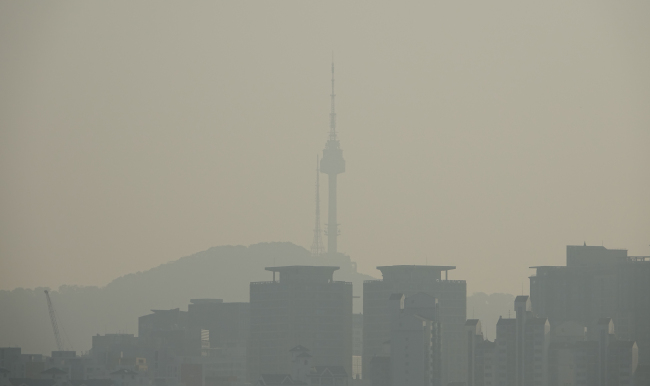South Korea aims to reduce fine dust by over 30% by 2022
Aged coal power plants will be shut down, diesel pollutants will be reduced amid rising public concerns over smog, toxic air
By Bak Se-hwanPublished : Sept. 26, 2017 - 15:43
South Korea’s environmental authorities on Tuesday unveiled a package of measures to tackle the worsening air pollution, including shutting down aged coal power plants and reducing pollutants from diesel vehicles and factories.
The measures are aimed at helping reduce fine dust emissions by more than 30 percent by the end of President Moon Jae-in’s term in 2022, authorities said.
The measures are aimed at helping reduce fine dust emissions by more than 30 percent by the end of President Moon Jae-in’s term in 2022, authorities said.

According to the Ministry of Environment, the Moon administration is set to close down seven of 59 coal-fired plants aged 30 years or over within itsterm to mitigate air pollution, while pushing forward to expand the use of green energy production methods like solar and wind power.
At present, coal provides about 40 percent of South Korea’s total power generation.
“The government’s stand is that we will not be planning to build new coal-fired plants,” Ahn Byung-ok, vice minister of the Environment Ministry, said at a press conference Tuesday.
The ministry added that 77 percent of 2.86 million aged diesel vehicles across the country will be retired by 2022 as part of a plan to curb fine dust.
The new measures also include tightening legal requirements for air pollutants released from vehicles and heavy industry.
The move is in line with President Moon’s pledge to reduce fine dust levels.
President Moon earlier temporarily suspended the construction of two new nuclear facilities as part of his pledges to shift to renewable energy.
The comprehensive measures came a day after Environment Minister Kim Eun-kyung and the ruling Democratic Party of Korea sought to quell public concerns over particulate matter, reiterating the importance of state efforts to fight hazardous, fine particulates.
Public concerns have recently been raised over the worsening air quality as the country’s skyline has for weeks been blanketed by hazardous smog and fine dust clouds.
The worries have centered mostly on the cause of the toxic air, which many critics believe is not only homegrown but also linked to neighboring China.
On Monday, Environment Minister Kim said the government is planning to elevate the ministerial-level issue of fine dust to involve the leaders of South Korea and China and Northeast Asia as a whole.
Ruling Democratic Party Floor Leader Woo Won-sik said at the meeting with the ministry that his party is determined to stage an “all-out war against fine dust to ensure citizens’ rights to health.”
Last year alone, the country’s dust levels were above 50 micrograms per cubic meter for 248 days. With the new package of measures, the government hopes to reduce the hazardous days to 78 days by 2022.
The World Health Organization classified the fine particulates as first-degree carcinogens, which can penetrate into the respiratory system and trigger fatal illnesses like cancer.
In the face of hazardous smog, cities and provinces have installed indoor sports facilities at schools and provided care centers for the elderly.
By Bak Se-hwan (sh@heraldcorp.com)












![[Today’s K-pop] BTS pop-up event to come to Seoul](http://res.heraldm.com/phpwas/restmb_idxmake.php?idx=644&simg=/content/image/2024/04/17/20240417050734_0.jpg&u=)




![[KH Explains] Hyundai's full hybrid edge to pay off amid slow transition to pure EVs](http://res.heraldm.com/phpwas/restmb_idxmake.php?idx=652&simg=/content/image/2024/04/18/20240418050645_0.jpg&u=20240419100350)

